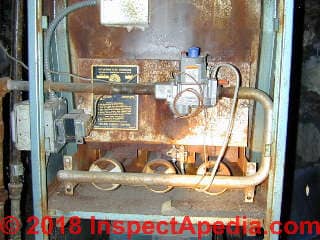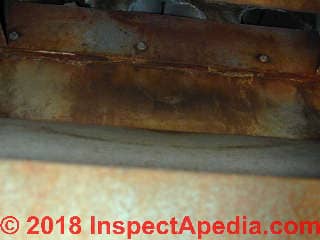InspectApedia Diagnose & Fix What's Wrong at Your Building (original) (raw)
 Heat Exchanger Corrosion
Heat Exchanger Corrosion
Furnace or Boiler Heat Exchanger Corrosion Leaks Causes & Prevention
- POST a QUESTION or COMMENT about causes of corrosion damage, leaks, failures in heating equipment heat exchangers
Causes of corrosion failures in heat exchangers used on furnaces or boilers.
What airborne contaminants, gases, or site conditions cause rust or corrosion failures in furnace heat exchangers, boiler heat exchangers, or swimming pool heaters?
InspectAPedia tolerates no conflicts of interest. We have no relationship with advertisers, products, or services discussed at this website.
- Daniel Friedman, Publisher/Editor/Author - See WHO ARE WE?
Heat Exchanger Corrosion Failures
 Watch out: leaks in furnace heat exchangers risk potentially fatal carbon monoxide poisoning.
Watch out: leaks in furnace heat exchangers risk potentially fatal carbon monoxide poisoning.
This article discusses corrosion failures in both furnace heat exchangers (forced-air heating systems) that transfer heat from the heat source or burner to building air, and also boiler heat exchangers that transfer heat from the burner or heat source to water for hydronic heating or for a swimming pool heating system.
Question: could my swimming pool heater be corroded by ozone?
2018/12/31 lmaliver@comcast.net said:
I have had to replace 2 pool funaces because of corrosion of the heat exchanger which is occurring from outside-in as opposed the the usual inside-out.
I have also noted that the gas pipes in the room have external rusting.
Several propane burners in the furnace have had to be replaced.
There is no odor in the room which is separate fro the room that has the salt water pool.
The pool pump is in this room and I wondered if it could be producing ozone.
Any suggestions before I put in another new pool furnace?
This Q&A were posted originally
at ODORLESS CHEMICALS / GASES: CHECK FOR?
Reply: Ozone not likely at a salt water pool. Is chlorine in use? Salt in air is corrosive.
Ima,
I am assuming, as you use the word "furnace" (which = forced hot air heat) that you are asking about corrosion of furnaces used to heat the area in and around swimming pools (presumably indoors),
and I am assuming that you are NOT asking about a hydronic heating system (hot water boiler) used to heat swimming pool water directly).
Both types of heating equipment can suffer corrosion from chlorine: as a gas emitted from chlorinated swimming pool water that thus gives that "chlorine" smell to swimming pool rooms and nearby rooms too, or in the case of pool heaters, as chlorine dissolved in water being circulated through the pool heater.
Now about your question,
Ozone can be corrosive depending on its concentration in air and the materials with which it's in contact.
More about ozone sources, smells, effects is
It may be likely that when you have a furnace heating areas in and around a swimming pool are the effects of chlorine gas from swimming pool water, or the effects of salt in airborne moisture (at a salt water swimming pool) on the furnace heat exchangers.
While salt itself reduces bacterial contamination, salt water pools also commonlhy use chlorine disinfectant,as well as an algecide.
Keep in mind that a salt water swimming pool also produces chlorine by breaking down salt in the pool water - salt consisting of sodium Na and Chloride molecules Cl (Salt = NaCl).
So it would be helpful if you can confirm just what disinfectants are in use in your salt water swimming pools.
Also consider that salt from your pools enters the air in the area; salt in air is itself highly corrosive and could explain an "outside-in" heat exchanger corrosion problem.
Indeed some furnace manufacturers specifically warn that IF your furnace operates in an area where certain chemicals are present in the air, outside combustion air should be provided for the furnace's oil or gas burner.
Checklist of Furnace or Boiler Heat Exchanger Corrosive Gases & Chemicals
Here is an example warning list of chemicals that are likely to cause extra damage to a furnace heat exchanger
The following types of furnace installations may require OUTDOOR AIR for combustion due to chemical exposures:
- Buildings with indoor pools
- Chemical storage areas
- Commercial buildings
- Hobby or craft rooms
- Laundry rooms
If air is exposed to the following substances, it should not be used for combustion air, and outdoor air may be required for combustion:
- Antistatic fabric softeners for clothes dryers
- Cements and glues
- Chlorinated waxes and cleaners
- Chlorine based swimming pool chemicals
- Cleaning solvents (such as perchloroethylene)
- De−icing salts or chemicals
- Carbon tetrachloride
- Halogen type refrigerants
- Hydrochloric acid
- HYDROGEN SULFIDE GAS
- Masonry acid washing materials
- Permanent wave solutions
- Printing inks, paint removers, varnishes, etc.
- Water softening chemicals
All fuel−burning equipment must be supplied with air for fuel combustion. Sufficient air must be provided to avoid negative pressure in the equipment room or space.
A positive seal must be made between the furnace cabinet and the return−air duct to prevent pulling air from the burner area.
References on Swimming Pool Corrosion Effects on Heating Equipment
- ICP Gas Furnace IO Manual: INSTALLATION INSTRUCTIONS Variable Speed Motor, Two−Stage ECM Motor and Single−Stage 35” Tall, High Efficiency Condensing Gas Furnace
(F/G)9MVT, (F/G)9MXT, (F/G)9MXE [PDF] at InspectApedia.com - Brazetek, PO Box 350367, Brooklyn, NY 11235 USA, Tel.: 718-874-0197, retrieved 2018/12/31, original source: www.brazetek.com/pool-heat-exchangers
Chlorine itself it highly corrosive to copper, brass and other common plumbing materials, which requires the heat exchanger to be chlorine-resistant to perform well over the long term. - Faller, M., and P. Richner. "Material selection of safety‐relevant components in indoor swimming pools." Materials and Corrosion 54, no. 5 (2003): 331-338.
- Oldfield, J. W., and B. Todd. "Room temperature stress corrosion cracking of stainless steels in indoor swimming pool atmospheres." British Corrosion Journal 26, no. 3 (1991): 173-182.
Abstract:
Work undertaken to elucidate failures of standard austenitic stainless steels in indoor swimming pool atmospheres which have occurred in recent years in Europe and North America is described. The unusual feature of these failures is that they occurred by a stress corrosion cracking (SCC) mechanism at ambient temperature.
Conditions which have given rise to room temperature SCC in laboratory tests are described and mechanisms which may give rise to such conditions in practice are postulated.
The work described also involved a survey of conditions in indoor swimming pools as well as experimental work on a range of stainless steels in various environments. - Prosek, Tomas, Anne Le Gac, Dominique Thierry, Sandra Le Manchet, Christian Lojewski, Amelie Fanica, Elisabeth Johansson et al. "Low-temperature stress corrosion cracking of austenitic and duplex stainless steels under chloride deposits." Corrosion 70, no. 10 (2014): 1052-1063.
- Prosek, Tomas, Anna Iversen, Claes Taxén, and D. Thierry. "Low-temperature stress corrosion cracking of stainless steels in the atmosphere in the presence of chloride deposits." Corrosion 65, no. 2 (2009): 105-117.
- Smith, Charles C., George OG Lof, Randy W. Jones, Reinhold Kittler, and Randall Jones. "Rates of evaporation from swimming pools in active use/Discussion." ASHRAE Transactions 104 (1998): 514.
It's also possible that air circulating out of the pool area and then through the heating furnace is also so high in chlorine as to add corrosive effects on the building air side of the heat exchanger, but the IO Manual I cited suggests that manufacturers cite chlorine gas (and other chemicals) in combustion air as a more-urgent concern.
This second possibility was the one that first occurs to me in response to your question and could explain your "corrosion from the outside-in" problem in the furnaces.
It would be useful to know the brand and model of furnaces whose heat exchangers corroded away in your case and then to see what the manufacturer says about using those furnaces to heat a pool area.
...
Continue reading at HEALTH DEPARTMENT HELP for RENTERS or select a topic from the closely-related articles below, or see the complete ARTICLE INDEX.
Or see these
Recommended Articles
- BOILER LEAKS CORROSION STAINS
- BOILER LEAKS, HOW TO LOCATE
- GAS DETECTION INSTRUMENTS
- HEAT EXCHANGER CLEANING
- HEAT EXCHANGER CORROSION
- HEAT EXCHANGER LEAK TEST
- HEAT EXCHANGER CLEANING
- HEAT EXCHANGER LEAK 3-STEPS
- HEAT EXCHANGER LEAK ALLOWED
- HEAT EXCHANGER LEAK TEST STANDARDS
- HEAT EXCHANGER LIFE & WARRANTY
- HVAC SYSTEM ODORS
- SAFETY, HEATING INSPECTION
- VENTILATION in BUILDINGS - home
Suggested citation for this web page
HEAT EXCHANGER CORROSION at InspectApedia.com - online encyclopedia of building & environmental inspection, testing, diagnosis, repair, & problem prevention advice.
Or see this
INDEX to RELATED ARTICLES: ARTICLE INDEX to BUILDING ODOR DIAGNOSIS & CURE
Or use the SEARCH BOX found below to Ask a Question or Search InspectApedia
Ask a Question or Search InspectApedia
Try the search box just below, or if you prefer, post a question or comment in the Comments box below and we will respond promptly.
Search the InspectApedia website
Note: appearance of your Comment below may be delayed: if your comment contains an image, photograph, web link, or text that looks to the software as if it might be a web link, your posting will appear after it has been approved by a moderator. Apologies for the delay.
Only one image can be added per comment but you can post as many comments, and therefore images, as you like.
You will not receive a notification when a response to your question has been posted.
Please bookmark this page to make it easy for you to check back for our response.
IF above you see "Comment Form is loading comments..." then COMMENT BOX - countable.ca / bawkbox.com IS NOT WORKING.
In any case you are welcome to send an email directly to us at InspectApedia.com at editor@inspectApedia.com
We'll reply to you directly. Please help us help you by noting, in your email, the URL of the InspectApedia page where you wanted to comment.
Citations & References
In addition to any citations in the article above, a full list is available on request.
ADVERTISEMENT